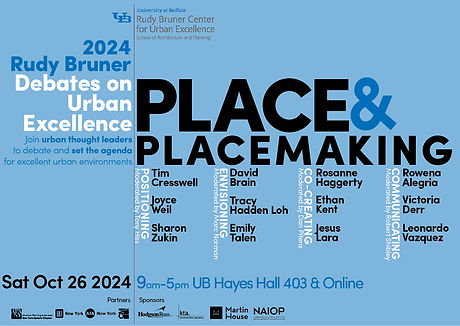URBAN AGENCY
The durable city cannot be conceived by designers alone, but must be perceived, lived, and adapted by citizens as a complex, self-emergent system, which raises significant questions about the agency of designers in this system.
Urbanist Richard Sennett describes this durability as an open-ended symbiosis between a built ville and the societal cité that inhabits, enlivens, and continuously alters it. This requires designers to understand how their built work relates to social, economic, and cultural forces. This challenges them to see how their built work impacts the world and vice versa.
In my research and teaching, I continuously question the agency of various stakeholders that shape the city. My research increasingly focuses on studying this agency in various books and symposia.
PLACE AND PLACEMAKING
A symposium and book on the value of place and the practices of making place
As the Director of Programs at the Rudy Bruner Center for Urban Excellence, I organized a symposium in which 12 of the world's leading thinkers on place and placemaking debated their perspectives on the pathways, pitfalls, and potentials for these core concepts of durable environments. Over three days in the fall of 2024, Rowena Alegria, David Brain, Tim Cresswell, Victoria Derr, Tracy Hadden Loh, Rosanne Haggerty, Tony Hiss, Ethan Kent, Jesus Lara, Marc Norman, Dan Pitera, Emily Talen, Leonardo Vazquez, Joyce Weil, and Sharon Zukin presented and discussed their views on the merits of place and placemaking, both publicly and in a more private setting. This allowed them to sharpen their thoughts and prepare them for a book publication with Routledge, for which I served as lead editor. The book will launch in 2026.


BOTTOM-UP URBANISM IN VARIOUS LOCATIONS, SHAPES, AND SCALES
Published as The Palgrave Handbook of Bottom-up Urbanism with Springer, 2018
Who shapes our cities? In an age of increasing urban pluralism, globalization and immigration, decreasing public budgets, and an ongoing crisis of authority among designers and planners, the urban environment is shaped by a number of non-traditional stakeholders.
The book surveys the kaleidoscope of views on the agency of urbanism, providing an overview of the various scholarly debates and territories that pertain to bottom-up efforts such as everyday urbanism, DIY urbanism, guerilla urbanism, tactical urbanism, and lean urbanism.
Uniquely, this books seeks connections between the various movements by curating a range of views on the past, present, and future of bottom-up urbanism. The contributors also connect the recent trend of bottom-up efforts in the West with urban informality in the Global South, drawing parallels and finding contrast between social and institutional structures across the globe. The book appeals to urbanists in the widest sense of the word: those who shape, study, and improve our urban spaces.
THE CASE FOR CITIES
An online conversation series on cities of choice and justic
Open any newspaper, news station or your social media, and you’d easily think American cities are doomed. Discussions on the COVID-19 pandemic and urban protests against racial inequality often suggest that our cities are at the heart of America’s health, sustainability and equity crisis. If some are to be believed, cities are reeling from an exodus of residents, office jobs, retailers and restaurants. Two decades of urban renaissance may well come undone over the span of less than a year.
Together with colleagues at the University of Cincinnati, I created an online conversation series in 2020. Dozens of urban leaders from various perspectives and perspectives demonstrated that cities are not the source of America’s current predicaments - cities are the ultimate solution to a healthier, more sustainable, and more equitable America. Cities have survived millennia of destruction, derision and disinterest, consistently re-emerging to fuel and nourish our hunger for human progress.
The series has been published as a book by Routledge in 2024.

